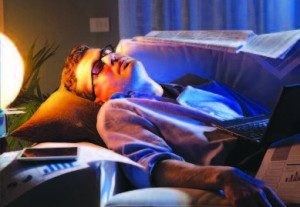Sleep: A Prescription for Better Health

In today’s time-pressed world, a full night’s sleep has become akin to a luxury, but beware: it is a vital necessity. Lack of sleep affects your health, from stress to heart disease to overall well-being. Even an occasional all-nighter impedes our ability to concentrate, analyze information, and significantly, to drive, making sleepiness at the wheel the cause of over 100,000 car accidents each year.
Call it a by-product of our increasingly hectic lifestyle: we now sleep two hours less nightly than our ancestors, and in just the last decade, another 38 minutes has been shaved off. Despite the fact that at least seven to nine hours of sleep is recommended for the average individual under 65, and for over 65, an average seven to eight hours, 40 percent of adults report sleeping less than six hours nightly. Additionally, between 50 and 70 million adults suffer from some sort of sleep disorder, with one in three saying they had trouble falling or staying asleep, according to the National Sleep Foundation.
To sleep, perchance to dream…
To understand why these numbers concern the medical community, consider how critical sleep is to human functioning. Many essential physiological activities that aid digestion, cell and tissue repair and growth, muscle growth, protein synthesis and release of growth hormone occur mostly, or sometimes only, during sleep. Sleep also regulates the hormones epinephrine, dopamine and serotonin, which are closely linked to mood and behavior.
The rejuvenating power of sleep is most evident during REM (rapid eye movement). This deepest, last, and most important phase accounts for 25 to 30 percent of the sleep cycle, when dreaming occurs. At this point, the learning region of the brain is stimulated, new neuronal connections are formed and proteins associated with aging and neural degeneration are eliminated. For example, one expert theory states the production of adenosine in brain cells remains high during wakefulness, but promotes the “drive to sleep.” Once the body has a chance to clear adenosine from the system during sleep, we wake feeling rested and more alert.
What happens when the body is regularly deprived of life-sustaining sleep? It’s enough to keep you more awake at night, with research pointing to the potential for: more frequent colds; irritability; lower quality of life; elevated blood pressure which can increase the risk of kidney disease; decreased insulin sensitivity and glucose tolerance (diabetes); impaired pancreatic cell responsiveness; calcification of coronary arteries (heart disease and stroke); mood disorders (anxiety and depression); and obesity (lower levels of appetitecontrolling hormone, leptin, and higher levels of ghrelin, which tends to make people ravenous). The immune system is particularly affected, as production of proteins needed by the body to fight infections and inflammations decreases.
Sleep easy
Reassuringly, an extra 15 to 30 minutes of sleep each night can make a significant difference in overall health and quality of life. Sleep specialists offer these tips:
- Disconnect. Sixty percent of Americans bring electronic devices along for the night. “We can’t resist the stimulation,” says Sleepless in America director John Hoffman. “It’s exceeding anything that we were designed to experience…its keeping us up beyond what we’re designed for.” Turn off phones, tablets and TV one hour before sleep time.
- Avoid alcohol before bedtime. Trickier than caffeine, alcohol typically makes it easier to fall asleep but the sleep is of poorer quality. Most people will fall asleep sooner, but spend less time in REM sleep and consequently wake up feeling less refreshed.
- Adjust your bedroom environment by decreasing light, noise and temperature so that you are comfortable for the night.
- Avoid discussing emotional issues or exercising right before bed, both of which can cause the body to secrete the stress hormone cortisol, associated with alertness.
- Try mindful meditation. Focusing on breathing and remaining in the present moment was found to improve sleep quality in older adults with moderate sleep disturbance, according to JAMA Internal Medicine.
- Reset your body clock. Frequent travelers and seniors are at particular risk for sleeping problems, including advanced sleep phase syndrome, which causes earlier than normal sleepiness and too-early wake up the next morning. Using specialized light boxes before bed or taking melatonin, the “sleep hormone,” have proven effective in readjusting circadian rhythms.
Still can’t get a good night’s sleep? Please call my office.

